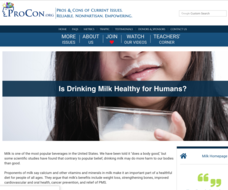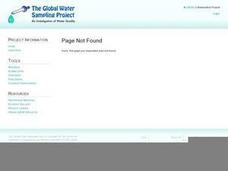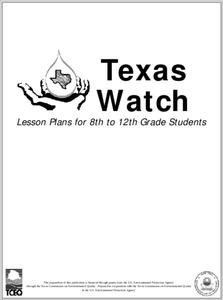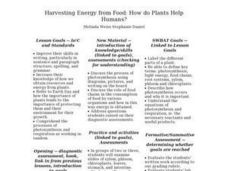Curated OER
World Consumption: Unequal Slices of the Pie
Students interpret the United Nations Human Development Reports and explain the relevance and use of the human development index in offering insight into a nation and its challenges. They draft a letter to the United Nations.
Curated OER
Waste Watchers
Students recognize the importance of saving energy to save natural resources. In this saving energy lesson, students complete a worksheet to find types of electricity meters in their homes. Students use meter readings to calculate energy...
NOAA
Seafood and Human Health
Whether your young biologists realize it or not, humans play a significant role in marine ecosystems. To help them understand this fact children first create graphical representations that show homo sapiens' place in marine food chains,...
Bridge
Mercury - Mercury is Rising
Hold a discussion in your class about the increase in mercury being found in fish that are caught commercially as food for humans. Given a worksheet, learners then calculate how much fish a person can safely eat each month to remain...
Advocates for Human Rights
The Right to a Clean Environment: Water
First, young citizens learn about water consumption by doing some research themselves on their home water usage and sharing their findings with the class. Then, they do some brainstorming and devise a plan to reduce water consumption.
ProCon
Milk
Milk: It does a body good ... or does it? Using the provided website, scholars sort through information to answer the question. They review a chart demonstrating lactose intolerance by ethnicity and region, and they also compare the...
Serendip
Carbohydrate Consumption, Athletic Performance and Health – Using Science Process Skills to Understand the Evidence
Should athletes carb load before an event or consume carbohydrates during the competition? Scholars discuss how to set up a hypothesis and experiment to answer a question relating carbohydrates and athletic performance. Then, they read...
Federal Reserve Bank
Ten Mile Day
Get your class working on the railroad with this detailed and interactive lesson. After reading and discussing Ten Mile Day, learners explore division of labor, human capital, and productivity with a hands-on group activity in which they...
Curated OER
Residential Power System
Perform data analysis on energy consumption to apply algebraic expressions to the real world. Learners will write and solve equations that answer various questions from residential power use. They will collect data at home and calculate...
Consortium for Ocean Science Exploration and Engagement (COSEE)
Carbon Dioxide & Krill: Impacts
What effects do temperature and carbon dioxide levels have on the zooplankton of Antarctica? This concluding lesson plan in a short unit on climate change and the ocean helps environmental scientists answer these questions. After...
Curated OER
What Is the History of the Consumption of Rice?
Sixth graders research the history of rice consumption. In this rice consumption lesson, 6th graders read a study guide and answer comprehension questions about two rice dishes and rice cultivation.
Teach Engineering
Energy Intelligence Agency
Protect the world from energy depletion—join the Energy Intelligence Agency. Using a set of cards, pupils distinguish between correct and incorrect information regarding energy use in the United States. They analyze graphs and diagrams...
Florida Department of Environmental Protection
Water's Journey Expedition
Step into a scientist's shoes to go online and discover the Florida Springs Expedition, and participate in two activities focusing on how humans impact the environment. The first activity asks scholars to summarize the six dispatches at...
Curated OER
Is It Ethical to Eat Meat?
Have your class join a blog about whether or not eating meat is good for you. They'll read several passages regarding meat processing and consumption, then they post what they think. There are six critical-thinking prompts to help them...
Curated OER
The Impacts of Human Activities on Biodiversity in New Haven County
Students discover how plants and animal ecosystems are affected by the growth of a city. In this ecology lesson, students study and observe a plant over a period of time. They develop a creative presentation of their data and share them...
British Council
Buy. Use. Toss.
Responsible consumption is never a waste of time. Using the engaging resource, scholars learn about the impact of waste on the planet, sorting trash into necessary and luxury piles. They then analyze their consumption habits, writing an...
Federal Reserve Bank
What Are the ‘Ingredients’ for Economic Growth?
Delve into the concept of economic growth with your class members, including why economic growth is important, what causes it, and how can countries encourage it.
Curated OER
Bottled Water Ban
Convenience, taste, portability ... what's not to love about bottled water? Apparently, a lot. Scholars analyze the four main arguments supporting and opposing the sale of bottled water. They explore the health, environmental, and...
Curated OER
How Much Water is There?
Students investigate the amount of fresh water on earth and which water can be used for consumption. In this fresh water lesson plan, students calculate the amount of fresh water that can be used for consumption on earth. They use a 5...
Curated OER
Water Quality Sampling
Students explore the water qualities in Texas. They evaluate the water quality of six different samples by observing and smelling them. They present a list of the cups that contained good water quality based on their observations. They...
Curated OER
What happens to water before we use it?
Students examine how water is treated prior to becoming available for human consumption. In this water treatment activity, students conduct an experiment in which they filter water. Students formulate a hypothesis, test, analyze data,...
University of Texas
What Are Calories?
What are calories, and how do calorie needs differ from person to person? Here is a worksheet that briefly explains how calories measure the energy supplied by food, as well as suggests the amount of food an individual should eat per day.
Curated OER
Harvesting Energy from Food: How do Plants Help Humans?
Beginning botanists view slides of plant vascular tissue. They watch Magic School Bus Gets Planted, which you can find online, and then write a summary of what they have learned about plants. This lesson could be used with upper...
Curated OER
You Need How Much Food When? Where?
Ninth graders explore how human activities shape the earth's surface. In this awareness lesson, 9th graders create pictographs showing the relations of food, people, land, and resources. Students complete worksheet.

























